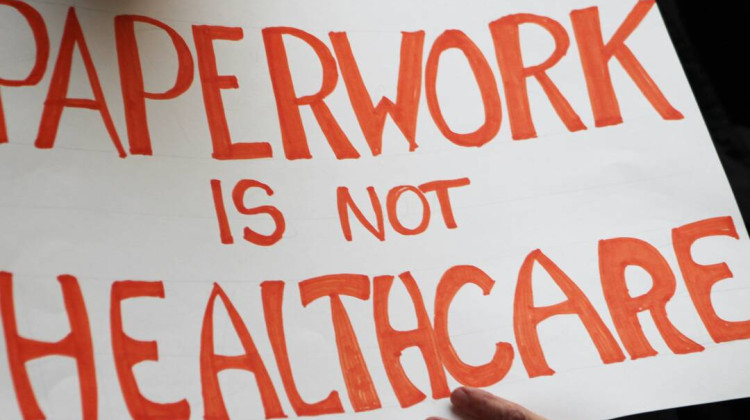
The uncertainty around the federal proposal may create instability for states that passed work reporting requirement legislation at the state level — like Indiana. One expert said Indiana can move forward with its plan, but it may be more practical to wait.
Abigail Ruhman / IPB NewsThere are 12 exceptions to the new work reporting requirements for the Healthy Indiana Plan, or HIP. But federal lawmakers proposed their own version of the policy for Medicaid expansion programs.
Medicaid experts said under that proposal, Indiana would no longer be allowed to provide several of those exceptions.
The federal proposal within the reconciliation bill includes some exceptions that overlap with Indiana's law, but may not go as far. Some exceptions weren't included in the "One Big, Beautiful Bill Act" at all.
Leo Cuello, a research professor at Georgetown University's Center for Children and Families, said the federal policy proposal lays out the exceptions for the program — but the specific policy details and regulations wouldn't be available to states until July 2027.
States won't be able to deviate from those regulations, which Cuello said is because lawmakers need people to lose coverage in order to generate savings.
"We're no longer in the world of states getting to decide how they want to run their own programs," Cuello said. "This becomes more of a top down environment."
Cuello said the current policy requires states to implement the work reporting requirements in 2029 — no sooner and no later.
"It's a huge bureaucratic mess, and it takes time to set that up, so that would be your legitimate reason for doing it," Cuello said. "It's obviously suspicious that it coincidentally is happening right after the next presidential election."
The uncertainty around the federal proposal may create instability for states that passed work reporting requirement legislation — like Indiana.
Cuello said Indiana can move forward with its plan, but it may be more practical to wait.
"It would not make sense to invest a whole lot of money to build a system which is no longer going to be matching the federal requirements that are about to come online," Cuello said.
Indiana lawmakers wanted to create work reporting requirements through a Medicaid waiver. It allows states to "waive" parts of Medicaid law as long as the waiver fits within the federal Medicaid statute. But waivers take time to put together and approve. By the time it's officially approved by the Centers for Medicare and Medicaid Services, it may be obsolete if the final federal proposal doesn't allow any state to apply for a waiver to the requirements.
"It doesn't make any sense to start this thing up now in a way that's in compliance with the rules that you're about to get hit with, and we don't even know what those rules are yet," Cuello said.
While Indiana may not be able to have all its exceptions, Cuello said the rule is likely to make sure states that aren't interested in taking away coverage or having a work reporting requirement can't soften the requirement at all.
"To the extent that the state is not compliant with something federal law requires, the state is going to have to make changes to come into compliance — including ways in which a state is trying to do this in a more thoughtful way, not hurting as many people," Cuello said.
Cuello said the federal proposal includes a number of changes to Medicaid and broader health care policy that threaten people's coverage — which he said will lead to more medical debt and worse health outcomes.
Cuello said the proposal allows states to create a "look back period" for work reporting requirements. If a state decides to use the look back policy, Medicaid members may have to prove they have met the work reporting requirement for the months leading up to their enrollment.
Another policy would affect access to Health Insurance Marketplace subsidies if someone doesn't qualify for Medicaid. Cuello highlighted it as a concern for advocates and experts.
If someone doesn't qualify for Medicaid and they meet certain income requirements, they typically receive a subsidy to help make insurance through the Affordable Care Act Marketplace, or Healthcare.gov, more affordable. Under the federal proposal, if someone doesn't qualify for Medicaid because they don't meet the work reporting requirement and they apply for insurance through the marketplace, they would be considered someone with insurance — meaning they don't get the subsidy.
Cuello said the federal measure shortens retroactive coverage from 90 days to 30 days. It also allows copayments for Medicaid to go as high as $35 a service.
"It almost looks like somebody sat down and said, 'What is a targeted list of cuts we can make that will drive up medical debt for American families?'" Cuello said "This is like the 'American family medical debt bill' is what you would call it. It's shocking to see the policies that they're pursuing here."
Join the conversation and sign up for the Indiana Two-Way. Text "Indiana" to 765-275-1120. Your comments and questions in response to our weekly text help us find the answers you need on Medicaid and other statewide issues.
In addition to cutting funding for Medicaid, Cuello said the proposal also puts limits on provider taxes. He said this puts states in a tough position to respond to cuts.
The Congressional Budget Office hasn't scored the full bill according to Cuello, but even their initial partial score estimated about 10.3 million Medicaid or Children's Health Insurance Program (CHIP) members would lose coverage by 2034. Indiana's Medicaid enrollment loss could be between 174,000 and 290,000 according to KFF analysis based on the initial CBO score.
Cuello said he and other Medicaid experts think the CBO underestimates the coverage loss.
"There is certainly the inference that maybe [federal lawmakers] realize people are going to be badly hurt by this work requirement and they may be trying to put that out past the next presidential election," Cuelleo said.
Cuello said he found the timeline to unveil regulation and policy details interesting.
"Those are set for after the next midterm election," Cuello said. "It's kind of like they don't want everyone to see the details of how this is going to work until after the midterms, and they don't want people to feel the pain until after the next presidential election."
However, Cuello said some federal lawmakers are pushing to shorten the timeline. He said there are some conservative lawmakers who are focused on increasing the size of Medicaid cuts.
"Because the sooner we start these work requirements, the sooner we start terminating people," Cuello said. "And the sooner we start terminating people, the sooner we ratchet up savings."
Cuello said federal lawmakers are still discussing what the final plan will look like, but it's moved quickly through the process. The first version of the bill that was available to the public was published on May 11.
"Even the text itself is all relatively new, and they were already moving it forward," Cuello said. "Then, it has possibly changed some over the weekend, and we're not sure in what ways it may have changed and what promises are being made or how the cuts are going to change."
The bill failed to make it through the U.S. House Budget Committee Friday, but was passed Sunday. Now, federal lawmakers said they expect to hear the bill in the U.S. House Rules Committee on Wednesday, May 21 at 1 a.m. Eastern. The bill would then be heard on the U.S. House floor at 1 p.m. Eastern the same day.
Cuello said lawmakers are voting on a bill that they still might not even have an accurate CBO score on.
But, there are still some Republican lawmakers who aren't willing to support the bill despite pressure from party leaders.
Abigail is our health reporter. Contact them at aruhman@wboi.org.
 DONATE
DONATE







 Support WFYI. We can't do it without you.
Support WFYI. We can't do it without you.